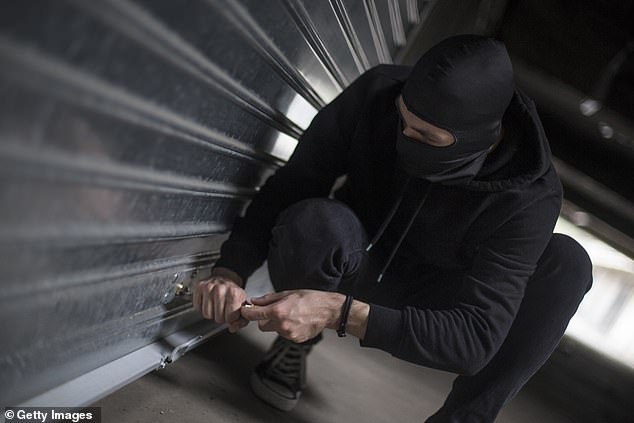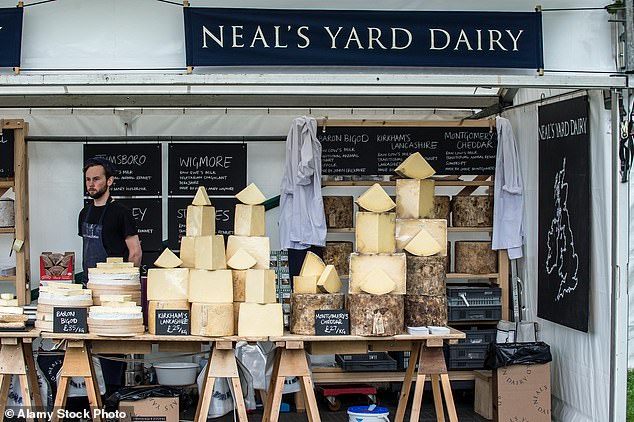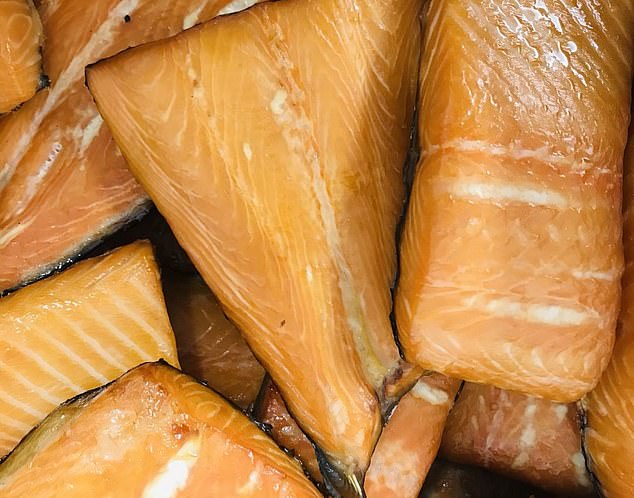A new crime wave is sweeping the UK and the crooks at the heart of it are brutally organised, disciplined and utterly ruthless.
They’ll spend months planning a heist. Nurturing or placing a man on the inside. Learning every detail of how their target business operates – the supply chain, the distribution pattern. They might set up a fake company with a brilliantly authentic-looking website. Or perhaps clone an existing company. They have all the correct paperwork, the sales patter and the knowledge.
And after the actual theft – often of hundreds of thousands of pounds worth of goods – the getaway logistics are planned like a military operation: chilled vans, decoy cargoes and a convoluted journey across international borders ending in warehouses with vast walk-in fridges. Because, for once, we’re not talking drugs. Or mobile phones. Or even cars.
But food. High end, luxury food. Think smoked salmon, artisan cheese, fine wine, single malt whisky. All stolen in vast quantities from some of the UK’s top independent suppliers – and most of it destined for Russia.
Chris Swales, 55, founder of Chapel & Swan Smokehouse in Exning, Suffolk, was conned out of frozen smoked salmon worth £37,000 last October.
‘I felt utterly idiotic that I’d been duped,’ he says. ‘And very, very angry that someone should take advantage of a small producer in this way.’

They’ll spend months planning a heist, nurturing or placing a man on the inside and learning every detail of how their target business operates (Pictured: Stock Image)

950 wheels of some of Britain’s most expensive cheeses was part of a 22-tonne fraudulent order that was prepared by Neal’s Yard Dairy (pictured), delivered to a warehouse in London – and never seen again
The same month, dairy farmer Patrick Holden lost two tons of Hafod cheese – a specialist product bound in muslin cloth, sealed with lard and aged for at least 18 months.
Patrick’s precious Hafod was part of a 22-tonne, £300,000 fraudulent order of 950 wheels of some of Britain’s most expensive cheeses, including Westcombe and Pitchfork, that was prepared by Neal’s Yard Dairy, delivered to a warehouse in London – and never seen again.
The story caused a big stir. Jamie Oliver warned his 10.5million Instagram followers: ‘If anyone hears anything about posh cheese going for cheap, it’s probably some wrong ‘uns.’
The newspapers headlined it ‘The Grate Cheese Robbery’. But not a mouse’s nibble of it has been recovered.
Break-ins at Scottish whisky distilleries are also up, with thieves targeting bottles worth thousands of pounds. Live lobsters have been stolen from storage pens in Scotland. And freight hijackings are on the rise. Last December, two men were arrested when police discovered £70,000 worth of stolen Johnny Cree whisky in a lorry near Bradford. The previous December more than £50,000 worth of cheese was taken from a trailer in a service station on the M5 near Worcester.
Tuggy Meyer, who runs The Huntsworth Wine Company in Kensington, West London, tells me he’s still picking up the pieces after losing 142 cases of fine wine, worth £200,000, stolen from a warehouse in 2019.
‘It was all top Bordeaux – 24 cases of Lynch-Bages, Yquem, Lafite, Mouton – all good years and mostly 2005. It was clearly stolen to order – they knew what they were doing,’ he says.
Like all the victims, Tuggy knows he will never see it again. And like Chris’s salmon and Patrick’s cheese, it has almost certainly ended up on dining tables in Russia.
Following Vladimir Putin’s first invasion of Ukraine in 2014, the West imposed a raft of sanctions on Moscow. In retaliation, President Putin banned the import of US and EU food, including fruit, vegetables, meat, fish, milk and other dairy produce. It led to acute shortages in the Russian supply chain. A large and lucrative black market grew as a result.
Of course, there has always been food theft in the UK. Often driven by need – from supermarkets, corner shops, farms, abattoirs. Though sometimes just opportunistic – a few legs of lamb for sale in a pub car park. A nice side of salmon swapping hands under the counter.
But lately, the figures have jumped massively. According to a report by the British Standards Institute, back in 2021, 18 per cent of supply chain thefts in the UK were related to food and drink. Two years later, this had increased to 24 per cent.

Chapel & Swan Smokehouse in Suffolk was conned out of frozen smoked salmon worth £37,000 last October (Pictured: Stock Image)
This was partly because the cost of food increased by a quarter between 2022 and 2024 – fuelled by everything from the pandemic to the Ukraine war, the cost-of-living crisis and poor harvests.
But it is at the luxury level that prices have really gone bananas. A nice bottle of Rousseau Chambertin is up sixfold in recent years. A 25-year-old single malt whisky can cost as much as £1,500. Even a hunk of artisan cheddar has risen by more than 30 per cent.
Experts are convinced this has fuelled many of these recent high-profile, high-value thefts – all stolen to order. ‘What we hear about is just the tip of a very dirty iceberg,’ explains Professor Chris Elliott, honorary professor of food security at Queen’s University, Belfast. ‘This is a huge market and a lot of it will end up in Russia.’
Just a few days ago, there were reports of a glut of fake butter on sale in Russia. ‘Bona fide brand names, but counterfeit,’ says Professor Elliott. ‘One third of butter tested in the Russian market has been adulterated in some way.’ It is usually watered down, exposing a shortfall in the real thing. ‘And that’s just butter!’
While Russia has a big dairy industry, it is not self-sufficient. And it would never be able to satisfy the population’s taste for British and European cheese.
Or wine. Professor Elliott says: ‘Wine is a big commodity in Russia. Particularly European fine wine. Not many people will be asking many questions about storage and provenance. They just want the wine.’
One of many alarming aspects about this new culinary crimewave is how experienced the criminals are.
Many are veteran drug dealers who, tempted by the large profits and relatively low risks, have switched lanes to luxury food. ‘They’ve done their homework. They know the industry, how we operate. They knew how to sound like a genuine buyer with a nice big order,’ says Chris Swales.
He certainly didn’t have any suspicions when ‘Patrick Moulin’ got in touch to suggest a collaboration with a French supermarket chain called Match and ordered £37,000-worth of frozen smoked salmon.
Yes, at nearly four tonnes, the order was bigger than some, and he had to rejig his cutting teams and arrange for frozen storage in Grimsby, but all Moulin’s communications were trade-standard and there seemed nothing odd about it.
Until two weeks later, when he noticed that they hadn’t paid. When he chased it up, they offered full payment on supply of another £55,000 of fish. Chris refused. When the line went dead, ‘I knew immediately that something was very, very wrong,’ he says.
He wasn’t the only one. Since his story emerged, others who had also been scammed got in touch with him. A producer from Northern Ireland lost £126,000 of fish and had to remortgage his house, cash in his ISAs and will now have to work until he’s at least 70 to make ends meet.
A haulage company, meanwhile, was left with unpaid invoices after shipping huge quantities of specialist Ukraine vodka to France last summer – again, ‘Patrick Moulin’ had been the contact.
‘Whoever they are, they are really, really savvy,’ says Chris. ‘They don’t care who they affect and their knowledge of food transport is incredible.’
Many have been smuggling drugs – usually in food shipments to distract sniffer dogs – and negotiating borders for years. They are used to transporting refrigerated goods – or ‘cold chain’ management – and have long had distribution networks up and running. Which is of course crucial, because much of this food is perishable and expensive to store.
So Professor Elliott thinks Patrick’s lovely cheddar with its specialist rind would have disappeared into the Russian food chain in a flash. Along with Chris’s smoked salmon – all 37,000 sides of it. ‘I never saw a whisper of it again,’ he says.
There seems little doubt it would have whizzed eastwards to Russia. ‘It’s a lot of salmon, seven and a half pallets – about 3.8 tons!’ he says. ‘So I’d have known if they tried to sell it here. And it would have been very difficult to sell it in the EU with all the paperwork.’
He even knows where it left from. Walthamstow docks. He tracked it himself. But he is frustrated by the police response. ‘They’re not even trying. I know where it went. I know it was delivered to Walthamstow, but they have literally made no attempt to take any of this forward.’
Perhaps because the minute stolen goods are in a lorry and heading to a UK port, they might as well be on the Moon. There is next to no checking of cargo on the way out of the UK and, even when it is Europe-bound, checks can be a hit and miss on arrival in Calais or Boulogne.
In any event, most food smugglers simply leapfrog Europe altogether, class their load as a ‘trans-shipment’ (not to be unloaded or sold within the EU) and send it on to Belarus, Hungary or Moldova – anywhere with a land bridge to, or cosy relations with, Russia.
This way, Chris’s salmon, Patrick’s cheese or Tuggy’s wine will be waved straight through Europe, untouched, until it hits the Russian border, which tends to be rather leaky, particularly when the demand there is so hot.
Meanwhile, the impact on victims – most of whom run family businesses and have thrown everything into their product – can be catastrophic. Not least because insurance rarely covers this sort of scam.
‘I’m insured for theft from my factory and vehicles,’ says Chris. ‘But as I hadn’t contracted the transport, I wasn’t covered. So it hit us very, very hard.’
Meanwhile, poor Tuggy is about half a million pounds down – considering the value of stolen wine and the wasted legal fees in trying, unsuccessfully, to claim reimbursement from the warehouse where the theft happened.
Professor Elliott says: ‘These people don’t care who they hurt, who gets damaged. What businesses go under. It’s all about making money.’
Chris Swales certainly agrees: ‘It didn’t just hit us financially,
but psychologically. It has been very difficult.’
Not least because producers have had to change the way they operate – putting tracker tags on their goods, upping security budgets, changing the way they view their customers, demanding up-front payment, even from regular customers, and trusting no one. ‘It’s not how we’ve ever operated and it’s not a nice way to do business, but we can’t take any risks,’ says Chris.
He and many others are learning the hard way that if an order looks too good to be true, then it almost certainly is.







